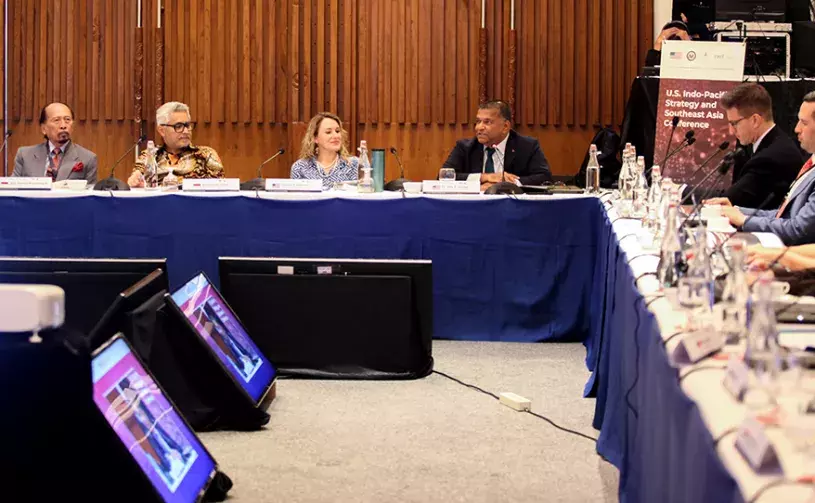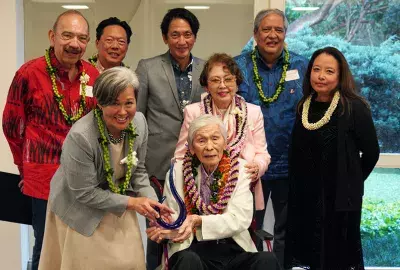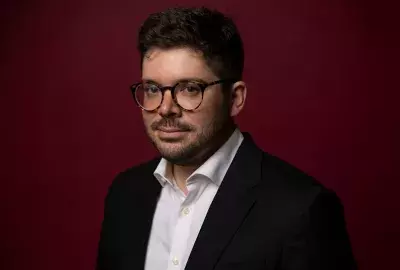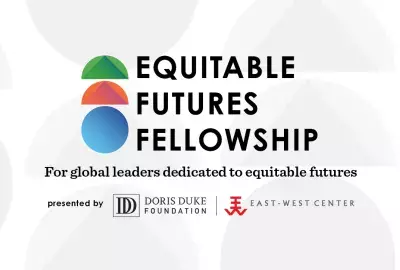Error message

OFFICE/DEPARTMENT
JAKARTA (Aug. 10, 2023) – Delegates from across Southeast Asia met with US officials and experts in the Indonesian capital today to share diverse perspectives on the 18-month-old US Indo-Pacific Strategy, covering such topics as regional security, economic integration, infrastructure development, and human rights.
Organized by the East-West Center (EWC) in collaboration with the US Department of State and the Foreign Policy Community of Indonesia (FPCI), the conference featured keynote remarks by Abdul Kadir Jailani, Director General of Asia-Pacific and Africa at Indonesia’s Ministry of Foreign Affairs, and Camille Dawson, US Deputy Assistant Secretary of State for East Asian and Pacific Affairs, along with opening remarks by FPCI Senior Fellow Ambassador Soemadi Brotodiningrat and East-West Center Vice President Dr. Satu Limaye.
These were followed by a closed off-the-record sessions to provide an opportunity for frank and constructive dialogue. The meeting was the final in a series of three such dialogues that EWC helped to coordinate in Washington, Honolulu, and Jakarta, at which American experts and officials shared perspectives with allies and partners from across the region.
In their remarks, Dawson and Jailani emphasized the importance of candid discussions and multilateral cooperation in developing a robust Indo-Pacific Strategy. The strategy “is grounded in our belief that a successful and stable Indo-Pacific region is rooted in the rule of law, good governance, strong democratic institutions, and the protection of human rights,” Dawson said. “This is a belief that we share with many of our partners and which aligns with the principles enshrined in the ASEAN Charter.”
Acknowledging that “the continuing rivalry among great powers has resulted in strategic distrust,” Jailani said that through the ASEAN Outlook on the Indo-Pacific, the Association of Southeast Asian Nations tries to offer a framework for managing such strategic competition - with ASEAN taking a central role.”
FPCI Senior Fellow Brotodiningrat noted the region’s economic complexity, which he said has produced “a noodle bowl of economic and trade agreements,” potentially made even more complex by the growing trend of what he termed ‘minilateral arrangements.’ “Whether this trend will strengthen inclusivity, or, on the contrary, will make the already complex ecosystem even more complicated, will depend on the motives behind their respective creations,” he said. “It is of course our hope that this conference will help clarify those complex situations, hence contributing to the overall advancement of Indo-Pacific cooperation.”
The East-West Center’s Limaye said that such suggestions for constructive improvement and new initiatives would be captured as part of the conference report. He also noted the gathering’s uniqueness and alignment with the Center’s mission of building better relations in the region through collaborative study, research and exchange.
JAKARTA (Aug. 10, 2023) – Delegates from across Southeast Asia met with US officials and experts in the Indonesian capital today to share diverse perspectives on the 18-month-old US Indo-Pacific Strategy, covering such topics as regional security, economic integration, infrastructure development, and human rights.
Organized by the East-West Center (EWC) in collaboration with the US Department of State and the Foreign Policy Community of Indonesia (FPCI), the conference featured keynote remarks by Abdul Kadir Jailani, Director General of Asia-Pacific and Africa at Indonesia’s Ministry of Foreign Affairs, and Camille Dawson, US Deputy Assistant Secretary of State for East Asian and Pacific Affairs, along with opening remarks by FPCI Senior Fellow Ambassador Soemadi Brotodiningrat and East-West Center Vice President Dr. Satu Limaye.
These were followed by a closed off-the-record sessions to provide an opportunity for frank and constructive dialogue. The meeting was the final in a series of three such dialogues that EWC helped to coordinate in Washington, Honolulu, and Jakarta, at which American experts and officials shared perspectives with allies and partners from across the region.
In their remarks, Dawson and Jailani emphasized the importance of candid discussions and multilateral cooperation in developing a robust Indo-Pacific Strategy. The strategy “is grounded in our belief that a successful and stable Indo-Pacific region is rooted in the rule of law, good governance, strong democratic institutions, and the protection of human rights,” Dawson said. “This is a belief that we share with many of our partners and which aligns with the principles enshrined in the ASEAN Charter.”
Acknowledging that “the continuing rivalry among great powers has resulted in strategic distrust,” Jailani said that through the ASEAN Outlook on the Indo-Pacific, the Association of Southeast Asian Nations tries to offer a framework for managing such strategic competition - with ASEAN taking a central role.”
FPCI Senior Fellow Brotodiningrat noted the region’s economic complexity, which he said has produced “a noodle bowl of economic and trade agreements,” potentially made even more complex by the growing trend of what he termed ‘minilateral arrangements.’ “Whether this trend will strengthen inclusivity, or, on the contrary, will make the already complex ecosystem even more complicated, will depend on the motives behind their respective creations,” he said. “It is of course our hope that this conference will help clarify those complex situations, hence contributing to the overall advancement of Indo-Pacific cooperation.”
The East-West Center’s Limaye said that such suggestions for constructive improvement and new initiatives would be captured as part of the conference report. He also noted the gathering’s uniqueness and alignment with the Center’s mission of building better relations in the region through collaborative study, research and exchange.







